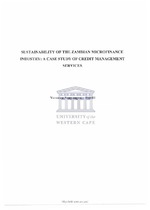| dc.contributor.advisor | Le Roux, P.J. | |
| dc.contributor.advisor | Musona, D. | |
| dc.contributor.author | Phiri, Veronica Nanyangwe | |
| dc.date.accessioned | 2019-11-26T10:52:03Z | |
| dc.date.available | 2019-11-26T10:52:03Z | |
| dc.date.issued | 2002 | |
| dc.identifier.uri | http://hdl.handle.net/11394/7093 | |
| dc.description | Magister Artium (Development Studies) - MA(DVS) | en_US |
| dc.description.abstract | This thesis is both a qualitative and quantitative study, investigating the sustainability of
Credit Management Services Limited (CMS) within the broader context of the Zambian
micro finance industry. Micro finance is regarded as one of the tools for poverty reduction.
As such, making microfinance available to many poor people is the purpose of
microJinance. Over the years it has become clear that microfinance institutions have to
operate efficiently and be self-sustai nable in order to continue assisting the poor.
However. in spite of the support and encouragement given for sustainability, evidence
shows that there are few sustainable microfinanee institutions in the world. The various
factors impacting upon sustainability therefore, need to be examined and means of
enhancing sustainabi Ii ty mapped out.
The study brought to the fo re the main viewpoints regarding sustainability and how they
have been inl1uenced by experiences of MFls around the world. The framework for
discussion and analysis of operational sustainability, financial sustainability and
operational e ffi ciency is also set out. The study discusses the Zambian microfinance
industry and shows how and why the industry has emerged and grown in the past decade.
Some constraints are identified that need to be dealt with in order to enhance
sustainability of the industry. The study of CMS reveals that the institution is not yet
fi nancially sustainable, but that its effi ciency levels are steadily increasing as it has put in
place mechanisms to recover costs, charge economic rates of interest and increase and
maintain its client outreach. Indicators are that it is moving in the right direction with its cost recovery. increasing client outreach and utilization of loans for on-lending as
opposed to subsidies. This study therefore draws on the general experiences of the Credit
management Services in order to draw lessons for the Zambian industry. The study will
argue the case that though sustainability is difiicult to achieve, there arc positive
indicators in the Zambian industry that this is possible and that CMS could be considered
as an example. This claim is verified against the experi ence on the ground of Credit
Management Services.
The study concludes that building a sustainable microfinance industry anywhere is not
the easiest task. Sustainabi lity is possible but requires a lot of investment in capacity
bui lding and del iberate steps for cost effi ciency, appropriate pricing poli cies and an
increased client outreach. The Zambian situation characterised by even a younger
industry. will require not only a concerted effort in capacity building, but much more, the
need to counter constra ints in the external environment of Mrls. Recommendations lo
stake holders inc lude the need to utilise cheaper local human resources and invest in
strengthening local institutions owned by local communities, to enhance the sustainability
or micro finance initiatives. | en_US |
| dc.language.iso | en | en_US |
| dc.publisher | University of the Western Cape | en_US |
| dc.subject | Sustainability | en_US |
| dc.subject | Micro finance | en_US |
| dc.subject | Operational sustainability | en_US |
| dc.subject | Collateral | en_US |
| dc.subject | Poverty-reduction | en_US |
| dc.title | Sustainability of the Zambian microfinance industry: A case study of credit management services | en_US |
| dc.rights.holder | University of the Western Cape | en_US |

